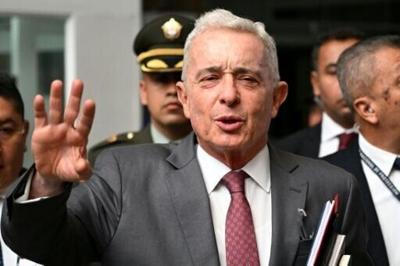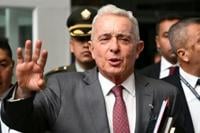A Colombian court on Tuesday overturned the witness tampering conviction of influential ex-president Alvaro Uribe, who had been sentenced to 12 years' house arrest in a decision condemned by the United States.
The 73-year-old, who led a relentless military campaign against drug cartels and leftist guerrillas as president from 2002 to 2010, was found guilty in August of asking right-wing paramilitaries to lie about their alleged links to him.
It marked the first time in Colombia's history that a former president was convicted of a crime and sentenced.
A law-and-order hardliner, Uribe was a close ally of the United States and retains close ties to the American right.
US Secretary of State Marco Rubio had slammed his conviction as "the weaponization of Colombia's judicial branch by radical judges."
On Tuesday, Rubio welcomed the reversal, saying: "Colombia's justice has prevailed as former President Uribe is absolved after years of the political witch hunt against him and his family."
- 'Vengeance' -
From his residence in Rionegro, about 30 km (18.5 miles) from Medellin, Uribe made a brief statement to the press, in which he thanked God and his lawyers.
"All I can tell you is that I told the truth," said the former president.
Uribe remains well-loved in Colombian right-wing circles for his campaigns against the now-disarmed FARC guerrilla army, but allegations of rights abuses have dented his popularity in some quarters.
Paramilitary groups emerged in Colombia in the 1980s to fight Marxist guerrillas that had taken up arms against the state.
A plethora of armed groups that emerged adopted cocaine as their main source of income -- the genesis of a deadly rivalry for resources and trafficking routes that continues to this day.
After leftist senator Ivan Cepeda accused him of ties with paramilitary groups responsible for human rights violations, Uribe is alleged to have contacted jailed ex-fighters to lie for him.
He denies the claims, but was found guilty on two charges: interfering with witnesses and "procedural fraud."
On Tuesday, an appeals chamber found there had been insufficient evidence against Uribe, that wiretaps used in the trial had been illegally conducted, and that the trial judge had committed errors of "methodology."
Cepeda, a presidential hopeful in elections next year, said Tuesday he would file a counter appeal to Colombia's Supreme Court of Justice.
Uribe is also under investigation in other matters.
He has testified before prosecutors in a preliminary probe into a 1997 paramilitary massacre of farmers when he was governor of the western Antioquia department.
A complaint has also been filed against him in Argentina, where universal jurisdiction allows for the prosecution of crimes committed anywhere in the world.
That complaint stems from Uribe's alleged involvement in the more than 6,000 executions and forced disappearances of civilians by the military when he was president.
Uribe insists his trial is a product of "political vengeance" with Colombia under its first-ever leftist president, Gustavo Petro.
"This is how the history of paramilitary governance in Colombia is covered up, that is, the history of politicians who came to power allied with drug trafficking," Petro wrote on X after Tuesday's ruling.
Petro added that Uribe ally US President Donald Trump, with whom the Colombian leader has been engaged in a heated public spat on a variety of topics, will now "seek sanctions" against him.
bur-mlr/aha/md




